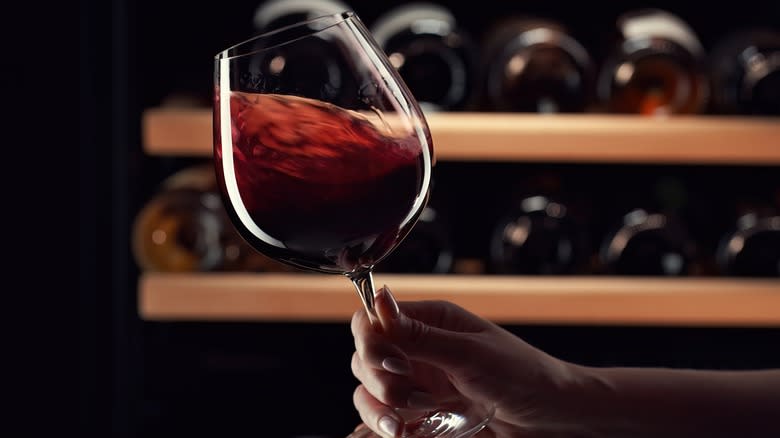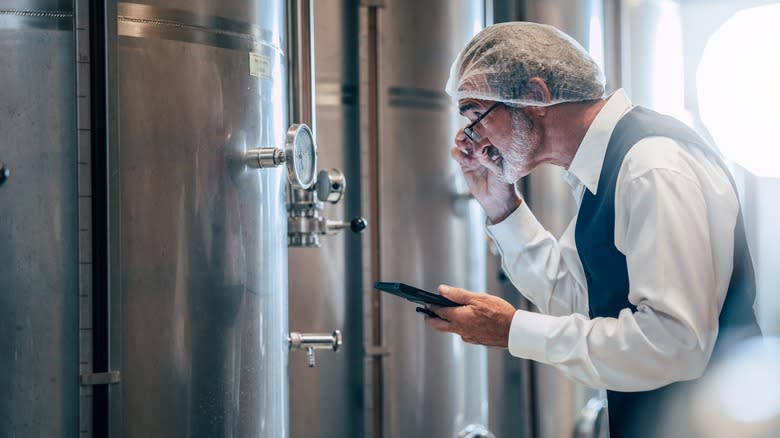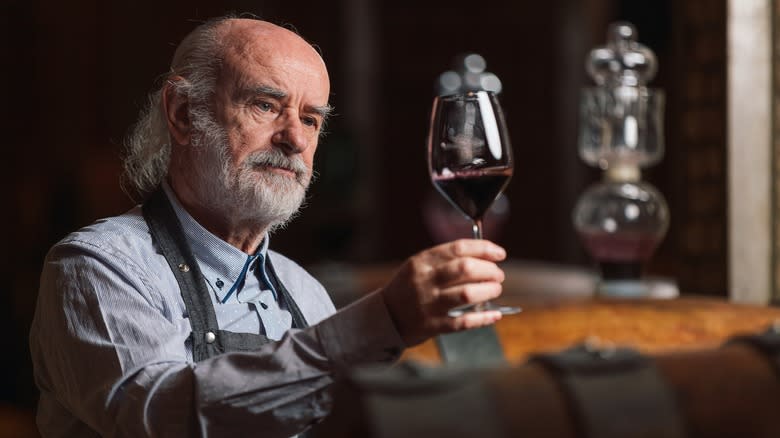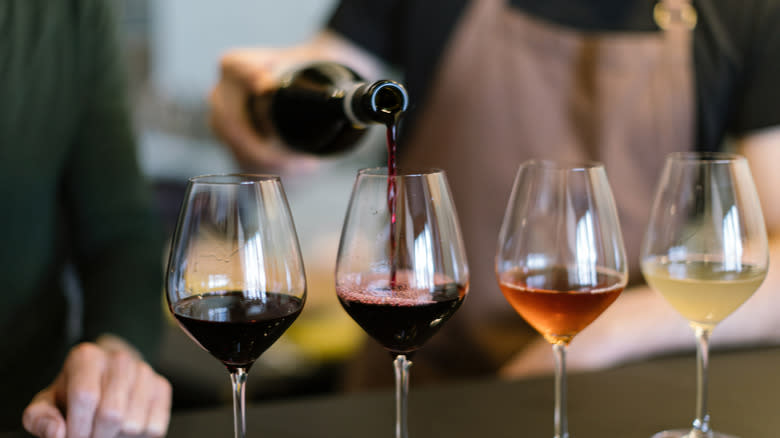Oenologist Vs Sommelier: What's The Difference Between These Wine Experts?

Although other types of alcohol are starting to imitate their success, wine experts are the original alcohol aficionados. There are two kinds of wine experts: sommeliers and oenologists. The short explanation of the two is that sommeliers are experts in tasting wine, whereas oenologists are experts in making wine. The two aren't mutually exclusive, either. Although many people will focus on just one, there's nothing stopping someone from becoming both a sommelier and an oenologist at the same time. The main limiting factor is the time and effort to achieve such a status.
You may be wondering how anyone ever managed to make a career out of something as fun and delicious as wine, but these experts are no joke. Oenologists are hard at work in the vineyards, maintaining the vines and ensuring the equipment is properly cleaned. Sommeliers get to enjoy the wines they taste, but the road to becoming a certified sommelier is long and demanding. Many ambitious wine lovers set out to tackle these particular mountains only to discover that the road is more difficult than expected.
Read more: The 40 Absolute Best Cocktails That Feature Only 2 Ingredients
What Is A Sommelier?

Sommeliers are the more commonly known of the two wine expert types thanks to popular movies and television shows like "Somm" and "Uncorked." Sommeliers are extensively trained to understand food and wine pairings, methods of wine service, and how to store wine properly. This means that professional sommeliers are in charge of the customer experience. For example, if they work at a restaurant, they will craft the wine menu so that what's on offer pairs nicely with the dishes, give the wait staff instructions on how the wine should be prepared, and ensure that it is served at the correct temperature. Sommeliers can also become wine directors, critics, educators, or consultants.
There are four levels of expertise: intro, certified, advanced, and master. Becoming a master sommelier is incredibly difficult, requiring years of diligent practice and a grueling multi-day test with a pass rate of less than 10%. There are more than 10,000 wine grape varietals, and, in the blind tasting portion of the test, candidates are asked to identify what grapes were used, what region the wine is from, and what year those grapes were grown. It's no wonder fewer than 300 people have ever accomplished such a task since the certification program began in 1969. Of course, there are thousands more who are sommeliers at a less prestigious level.
What Is An Oenologist?

An oenologist, sometimes spelled enologist, is an expert at producing wine. Oenology is the study of wine, so an oenologist understands winemaking on a technical level. Despite humanity's rich history of wine production dating back to 6,000 BC, oenology today is a product of the 20th century. Oenologists work within the field of science, running tests and gathering data to inform their decisions. At a basic level, the oenologist is responsible for everything involving production. That includes planting the grapes, harvesting them, turning them into wine, bottling, and even marketing the wine once it's done.
There isn't a clear distinction as to who qualifies as an oenologist compared to sommeliers, who have specific tests you must pass. Many oenologists do, however, get a degree in a related field. There are bachelor's and master's degrees in oenology, but other commonly earned degrees include chemistry, agriculture, biology, and pharmaceuticals.
The day-to-day tasks of an oenologist depend on the vineyard they work at. At a large vineyard, an oenologist may work exclusively in the lab, sampling pH levels and ensuring everything is on track with the grapes and wine. In smaller vineyards where the output is less and the amount of lab work is lighter, oenologists may be more hands-on with the physical labor aspects of the winemaking process.
Front Versus Back Of House

The primary difference between the two professions is with which part in the life of a bottle of wine they are involved. Oenologists are at work throughout pre-production, production, and post-production. Wine consumers will only see an oenologist at work if they visit the vineyard.
Sommeliers are experts in the hospitality industry. Although they will have some knowledge concerning how wine is made, they are typically only concerned with those aspects that affect the consumer. The tail end of a wine's lifespan is when the sommelier comes into play.
This focus may help explain why sommeliers are more well-known than oenologists. Since most people interact with wine as consumers, it makes sense that they would associate wine with the person responsible for consumer interaction. It's similar to how servers and bartenders are the face of a restaurant, where the chefs in the kitchen are out of the spotlight.
Sommeliers Are Options, Oenologists Are Necessary

Not every bottle of wine will pass through the hands of a sommelier, but every single bottle of wine will pass through the hands of an oenologist. Sommeliers are highly trained hospitality experts and, as such, are more frequently found at fine dining restaurants, high-quality hotels, and premium wine bars. Unless the restaurateur is attempting to give you a high-end dining experience at a premium price, it's unlikely that they will see the cost of hiring a sommelier as worthwhile.
Oenologists, on the other hand, are not optional. There are small vineyards, with only one or two people on staff, who don't have an official oenologist who specifically works at that vineyard, but even these vineyards need to have their wine tested. To do this, they ship samples to a third-party oenologist who does that work for them. The equipment to run those tests isn't cheap, so this may be the most cost-effective method. Once you reach high wine output at a large vineyard, it is more efficient to have your lab on-site with an oenologist on the payroll. Either way, an oenologist is necessary in some capacity. It should be noted that only four countries officially recognize the title of oenologist -- Italy, France, Spain, and Switzerland. Other countries are beginning to adopt it but will likely still use the more general term winemaker.
Sommeliers Have A More Broad Range Of Wine Knowledge

One of the major difficulties in becoming a master sommelier is the enormous breadth of wine knowledge the candidate must memorize. Thousands of different grapes, an entire world of differences in terroir, an understanding of how weather conditions affect taste, which years specific grapes experienced those weather conditions, and a palate that can identify these differences to a precise degree.
Oenologists don't need to have such a wide range of knowledge. They only need to know about the specific type of wine they are making. If an oenologist is interested in branching out into new territory, they'll need to read up on the science of how that wine is made, but until then, there isn't much benefit to knowing more than you need to. That's because, unlike a sommelier, an oenologist doesn't have a lot of variance in their work. Oenologists aren't randomly going to have a new grape variety pop up in their field, nor are they suddenly going to need to know how to make a syrah when they usually make chianti. Sommeliers, on the other hand, have quite a lot of variance. Each consumer they are working with will have preferences and questions. A good sommelier must be prepared for anything.
Read the original article on Tasting Table.

